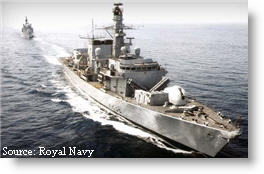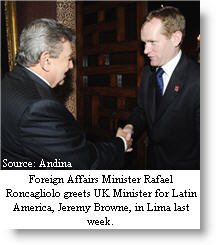 In a late call to the British Foreign Office on Tuesday, Peru attempted to explain it’s last minute decision to block the visit of Britain’s HMS Montrose, a Duke-class navy frigate, that was set to arrive at the port of Callao on Thursday.
In a late call to the British Foreign Office on Tuesday, Peru attempted to explain it’s last minute decision to block the visit of Britain’s HMS Montrose, a Duke-class navy frigate, that was set to arrive at the port of Callao on Thursday.
Peruvian Foreign Affairs Minister Rafael Roncagliolo, told state news agency Andina that the last-minute decision to withdraw its invitation was taken to show solidarity with Argentina, which has a long-standing dispute with Britain over the sovereignty of the Falkland Islands.
No indication of this decision was given, however, during the visit in Lima only four days earlier of Jeremy Browne, the British Minister of State for Latin America, who held meetings not only with business and government officials but with the Foreign Affairs minister, Rafael Roncagliolo, on furthering Peru-British ties and cooperation on a number of specific issues. The negotiations included shared cooperation agreements on fighting drug trafficking, and an understanding on industrial cooperation covering defense matters.
In early February, President Humala’s government had sent a note to Argentina’s President Cristina Fernandez to back Argentina’s “aspiration of reaching a peaceful understanding” with the United Kingdom over the islands, but only a week later had also sent a request to Congress to authorize the mooring of the HMS Montrose in Callao in late March. Congress approved the request on Feb. 28.
 In a statement this week, the British Embassy in Lima said the HMS Montrose’s planned visit to Peru was “part of a routine deployment to the region.”
In a statement this week, the British Embassy in Lima said the HMS Montrose’s planned visit to Peru was “part of a routine deployment to the region.”
“This was agreed as an act of friendship and cooperation between Peru and the UK,” the embassy said. The embassy added that it “regrets” Peru’s decision to revoke the visit.
“This is despite the Peruvian Government having had the opportunity on Friday to raise any concerns it had about this agreed cooperation with Minister Jeremy Browne during his visit to Lima,” it said.
“This decision has been made in the spirit of commitment to Latin American solidarity assumed in the framework of Unasur respecting the legitimate rights of the Argentina Republic in the sovereignty dispute,” Roncagliolo said.
While the government’s decision was praised by many in the government and by diplomats such as Jose Antonio Garcia-Belaunde, minister of Foreign Affairs during President Garcia’s administration, there were also many who criticized the last-minute about-face, including former vice-minister of Foreign Affairs, Luis Solari, who considered the decision was “unnecessary and unfriendly.”
Retired vice-admiral Jorge Montoya, former commander-in-chief of the Armed Forces, considered the decision a mistake because it showed an “unacceptable” weakness under (Argentina’s) pressure.
“When a warship requests permission for an operational visit, as is the case here, it is certainly for logistic provisioning, possibly also for fuel,” Montoya said in an op-ed column in El Comercio on Tuesday. If this is the case, Montoya said, the situation could turn complicated and the ship might require a “forced arrival,” which would be awkward for both countries.
Montoya also questioned Argentina’s reliability in its foreign policy, a matter raised by several members of Congress, including Lourdes Alcorta, who recalled Argentina’s lack of loyalty to Peru during the Peru-Ecuador situation in the 1990s.
Peru has a long history of supporting Argentina, including in the Falklands dispute. It gave its full support to Argentina during the Falklands War, providing air force support and Exocet missiles, as well as navy transport of weapons that Argentina had bought from Israel but could not access because of the war.
But the ties go deeper and there has always been a strong rapport between Argentina and Peru’s military. Argentina was also a signatory and guarantor of the Peru-Ecuador peace treaty signed in 1942 and was thus a monitor of relations between both countries.
However, during the Peru-Ecuador war in 1995, its President, Carlos Menem, sold weapons to Ecuador, a fact that cut deeply into public opinion in Peru.
Tensions have increased in recent months in the South Atlantic, as Argentina seeks to gain control of the Falkland Islands and has sought the support of neighboring countries to block entry of Falklands-flag ships into their ports.
Britain has said that it is “fully committed” to the Falkland islanders’ right to self determination. “This position will not change,” it said on Monday.
Britain, which explored and established settlements on the islands from the mid-17th century —as did the French and the Dutch— regained and controlled sovereignty over the islands in the mid-19th century, although Argentina has always considered them —the Islas Malvinas, from the French malouins, or sailors from St. Malo— part of its territory.
In 1982, Argentina invaded the South Atlantic islands, which provoked a 74-day war with the UK that resulted in Britain regaining control of the islands. Casualties included 250 British soldiers and 650 Argentine soldiers dead, and the sinking of the HMS Sheffield and the Argentine cruiser General Belgrano. Both nations restored relations in 1989 but the agreement left the sovereignty dispute aside.





